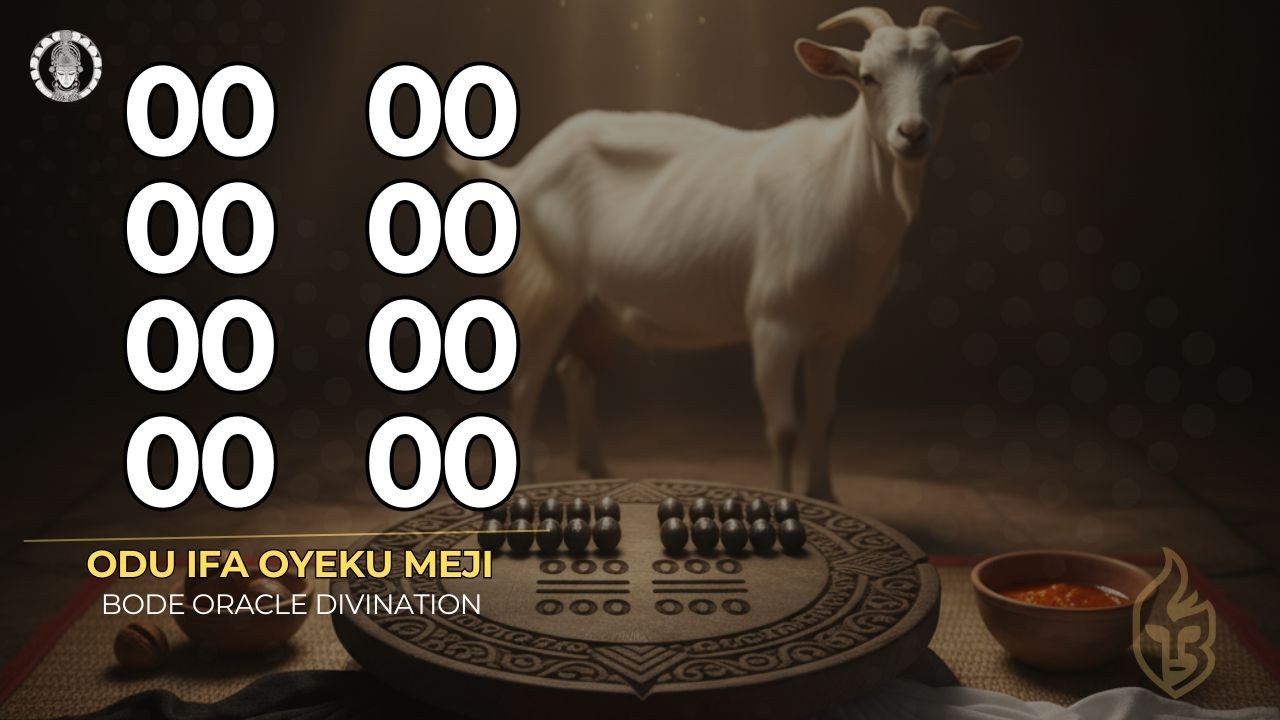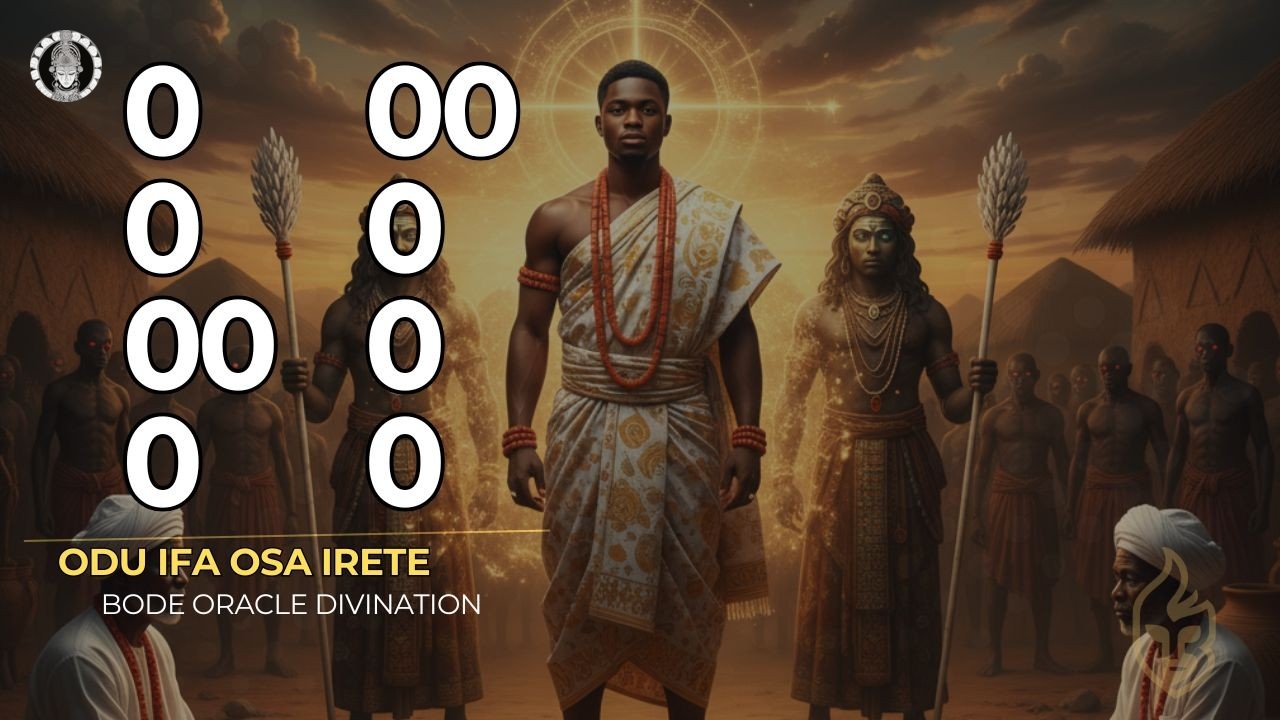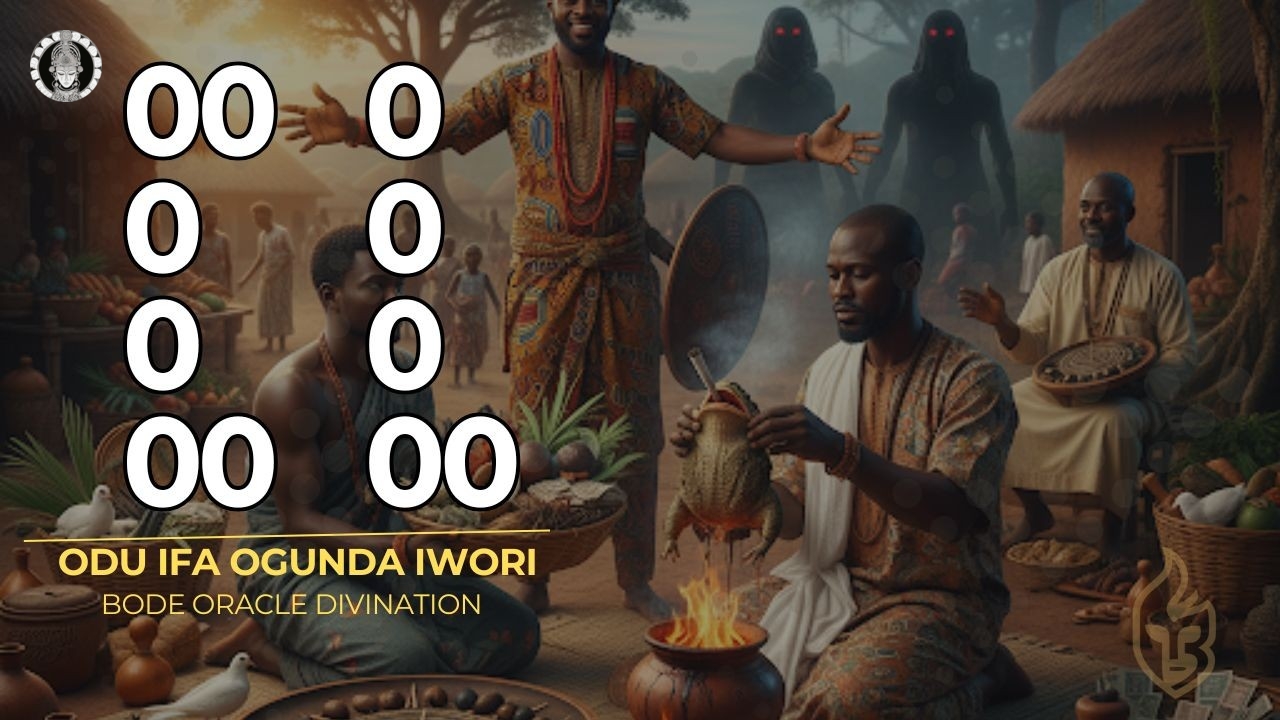Introduction to Odu Ifa Ogunda Iwori
Odu Ifa Ogunda Iwori represents one of the 256 sacred divination signs in the Ifa corpus, formed by the combination of Ogunda (the Odu of clearing obstacles and determined action) and Iwori (the Odu of deep wisdom and spiritual patience). This powerful union creates a divination sign that speaks to the fundamental relationship between devotee and divinity, promising unwavering spiritual support, comprehensive material and spiritual blessings, and victory over both visible and hidden enemies.
What distinguishes Ogunda Iwori from many other Odu is its explicit emphasis on proximity and constancy in the devotee-Ifa relationship. This Odu doesn't merely promise blessings contingent on sacrifice; it establishes Ifa as an active companion who never abandons those who maintain proper spiritual practice. The repeated theme across all divinations within this Odu is that Ifa itself facilitates the arrival of blessings, protects against enemies, and ensures the permanent attachment of prosperity to those who stay close.
The divinations within Ogunda Iwori address core human needs and fears: the need for reliable spiritual companionship in an uncertain world, the desire for wealth that doesn't slip away, protection from enemies both known and unknown, victory in competitions and conflicts, and the assurance that performing prescribed rituals will yield tangible, lasting results. Each story demonstrates how proper sacrifice combined with consistent devotion transforms potential into reality, isolation into security, and struggle into triumph. For comprehensive understanding of the 16 Odu Ifa and their meanings, explore our detailed guide.
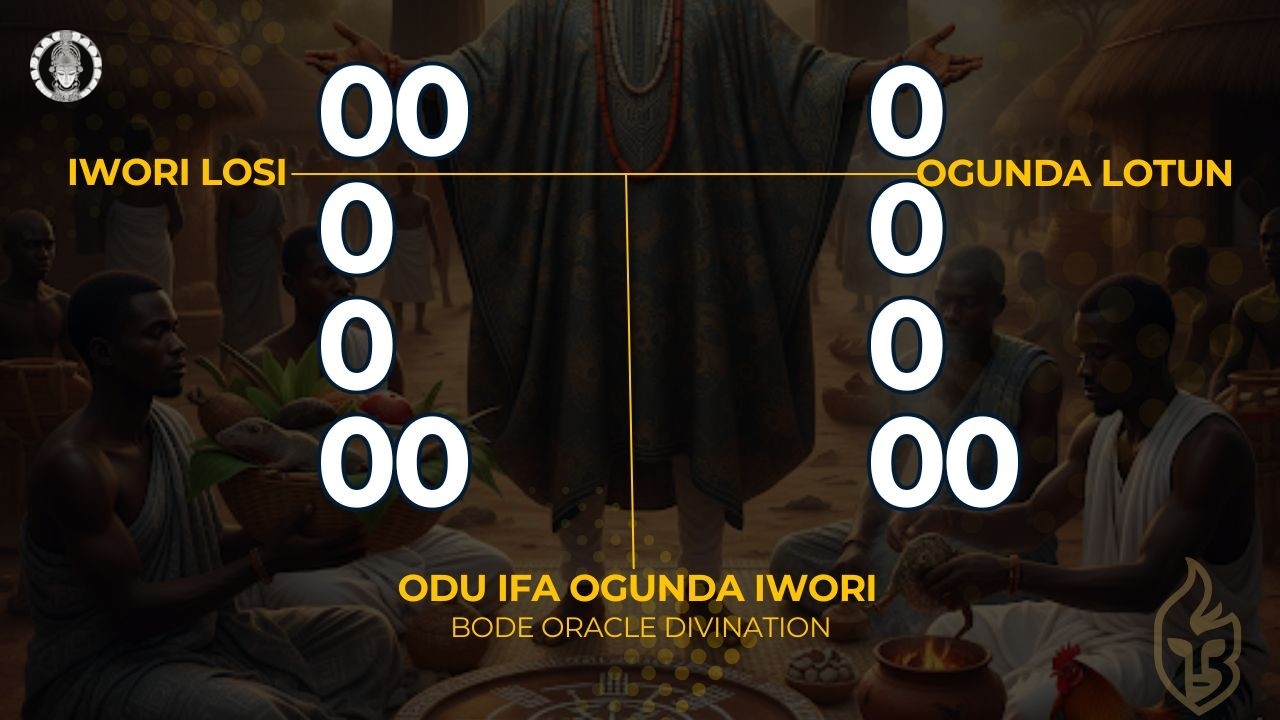
Ifa Divination for Jaja: The Foundation of Unwavering Spiritual Loyalty
The Client of the Crocodile
This divination from Ogunda Iwori introduces us to Jaja, described as being "niwara"—a client or devotee of the crocodile. In Yoruba cosmology, the crocodile represents ancient wisdom, patience, and the ability to thrive in both terrestrial and aquatic realms. By identifying Jaja as the crocodile's client, this divination establishes him as someone who has learned to navigate multiple dimensions of existence—the seen and unseen, the material and spiritual.
The crocodile's nature provides insight into what this Odu teaches: just as the crocodile remains submerged for long periods yet is always aware and ready to act, so too must the devotee maintain consistent spiritual presence even when immediate results aren't visible. The crocodile's patience is legendary—it can wait motionless for the perfect moment to seize its prey. Similarly, Ogunda Iwori teaches that blessings come not through anxious striving but through patient maintenance of proper spiritual relationship.
The Sacred Verse
Aduropon aberepon
Adifafun jaja niwara
Ti se inanja oni
Ebo won ni ose
O si gbebo nibe o rubo
Nje jaja ni wara
Ibo lon fifa le lo
English Translation
Aduropon aberepon
Ifa divination was cast for Jaja niwara
Who was the client of the crocodile.
He was asked to offer the sacrifice,
And he complied.
Therefore, Jaja ni wara,
Where do you live with your Ifa?
The Critical Question: Where Do You Live With Your Ifa?
The concluding question—"Where do you live with your Ifa?"—represents the heart of this divination's teaching. This is not a rhetorical inquiry but a pointed challenge about the nature of one's relationship with Ifa. In Yoruba spirituality, "living with" implies intimate cohabitation, daily interaction, and mutual responsibility. The question demands honest assessment: Is Ifa a concept one believes in abstractly, or a living presence one engages with constantly?
The question also implies physical reality. Where is your Ifa shrine? How often do you visit it? Do you maintain the prescribed offerings and cleanliness? Have you created space in your home and life for Ifa's presence? The divination suggests that blessings flow most readily to those who can answer this question with specificity and confidence—"Ifa lives here, in this shrine, which I tend daily, where I consult regularly, where offerings are never neglected."
Ifa's Promise of Active Companionship
What makes this divination particularly powerful is Ifa's explicit promise: "It is Ifa who will allow you to recover the blessings; you must always be at its side and never leave it." This statement transforms the devotee-divinity relationship from transactional (I sacrifice, you bless) to covenantal (I remain faithful, you remain present). Ifa doesn't merely respond to specific requests but actively works to ensure blessings reach the devotee who maintains proximity.
The instruction to "never leave" Ifa carries weight in a world full of competing spiritual claims and distractions. It warns against the modern tendency toward spiritual eclecticism—collecting practices from multiple traditions without deep commitment to any. Ogunda Iwori teaches that depth of relationship produces greater results than breadth of exposure. The devotee who stays with Ifa consistently, through prosperous and difficult times, receives blessings that those who wander spiritually cannot access.
Prescribed Offerings (Ebo)
For those who receive this divination seeking to establish or restore proper relationship with Ifa, the prescribed offerings are comprehensive: doves (eyele), representing peace and the gentle opening of spiritual channels; a rooster (akuko adie), announcing dedication and awakening spiritual forces; snails (igbin), symbolizing patience and the home-based nature of proper spiritual practice; a hen (aboadie), representing nurturing and the domestic establishment of spiritual presence; money (opolopo owo), facilitating all necessary ceremonies and maintenance; rat (eku), clearing obstacles; and fish (eja), ensuring smooth flow of blessings. Learn more about Ogunda Iwori divination practices on our dedicated page.
Modern Application
In contemporary contexts, this divination speaks to those who feel spiritually adrift, who have shrines they rarely visit, who perform divination but don't implement guidance, or who maintain Ifa practice irregularly. The Odu calls for recommitment—not just renewed belief but renewed proximity, not just occasional sacrifice but consistent presence. It promises that such recommitment will be met with Ifa's active assistance in recovering blessings that may have slipped away due to spiritual distance.
Ifa Divination for Aja Olele: The Promise of Comprehensive Blessing
The Thief-Dog and Divine Abundance
This divination introduces us to Aja Olele—the "thief-dog" or clever dog—who consulted Ifa before embarking on priestly work in the town of Oroo. The designation "olele" (thief) is not condemnatory but recognizes the dog's cunning intelligence and ability to acquire what it needs through wit rather than force. In Yoruba thought, the dog represents loyalty, protection, and the ability to navigate both domestic and wild spaces—qualities essential for successful spiritual practice.
The dog's journey to Oroo for spiritual work represents any devotee's venture into new territory—whether geographical relocation, career change, new relationships, or spiritual advancement. The divination addresses the anxiety of such ventures: Will I succeed? Will my needs be met? Will this transition bring blessing or hardship? Ogunda Iwori's response is comprehensive and reassuring.
The Sacred Verse
Kokole beeni kosun ori igi
Koroko koje erupe ile
Ko bawon gbongun oowe kotoro eja je lowo won
Kotoro okasa lowo gbondo gbondo
Adifafun aja olele
Tin sawo lo sode oroo
Ebo ni won ni ose
O si gbebo nibe o rubo
English Translation
Kokole be the way one climbs to the top of the tree
Koroko is how one traverses the earth
They accompanied them to the riverside to catch fish
They caught the fish gbondo gbondo (abundantly)
Ifa divination was cast for Aja Olele
Who was going on priestly mission to the town of Oroo.
He was asked to offer sacrifice,
And he complied.
The Repetitive Declaration of Total Blessing
The power of this divination lies in its comprehensive, repetitive promise: "Ifa says I will have wealth, and I have wealth, Aja Olele; the Ifa that was cast for me came to pass. Ifa says I will have a spouse, and I have a spouse, Aja Olele; the Ifa that was cast for me came to pass. Ifa says I will have children, and I have children, Aja Olele; the Ifa that was cast for me came to pass. Ifa says I will have all good things, and I have all good things, Aja Olele; the Ifa that was cast for me came to pass."
This repetitive structure serves multiple purposes. First, it emphasizes completeness—no area of human aspiration is left unaddressed. Wealth (aje), marriage (aya), children (omo), and "all good things" (ire gbogbo) represent the totality of what humans typically seek. Second, the repetition creates a rhythmic affirmation that embeds itself in consciousness, transforming from prophecy to present reality through declaration. Third, each repetition acknowledges Ifa's accuracy—"the Ifa that was cast for me came to pass"—building confidence in divine guidance.
The Journey Context
Ifa specifically addresses those who contemplate journeys: "If this person desires to embark on a journey, they should consult Ifa and offer sacrifice so that when they return, they will have succeeded." This transforms travel from mere geographical movement into spiritual opportunity. The journey becomes not just physical relocation but a transition point where proper sacrifice can secure blessings that might otherwise remain inaccessible.
The requirement to consult before departure and offer sacrifice emphasizes proactive spiritual preparation. Success isn't left to chance or talent alone but is secured through deliberate spiritual engagement before the journey begins. The promise of return "with success" implies not just survival but thriving—coming back with more than one left with, whether materially, spiritually, or both.
Prescribed Offerings (Ebo)
For comprehensive blessing across all life areas, Ifa prescribes a hen (agbeboadie), representing domestic prosperity and nurturing of opportunities; rat and fish (eku ati eja), traditional symbols of provision and smooth passage; a rooster (akuko adie), announcing victory and success; doves (eyele), ensuring peace accompanies prosperity; and money (opolopo owo), facilitating all necessary spiritual and practical preparations.
Modern Application
In contemporary contexts, this divination speaks powerfully to those facing major transitions—new jobs, relocations, marriages, business launches, or any venture into unfamiliar territory. It promises that proper spiritual preparation before such transitions doesn't just improve chances of success but guarantees comprehensive blessing. The devotee doesn't merely survive the transition but emerges with every category of blessing firmly established. For deeper understanding of Yoruba spiritual philosophy and divination systems, consult scholarly resources on African Traditional Religions and Ifa Divination.
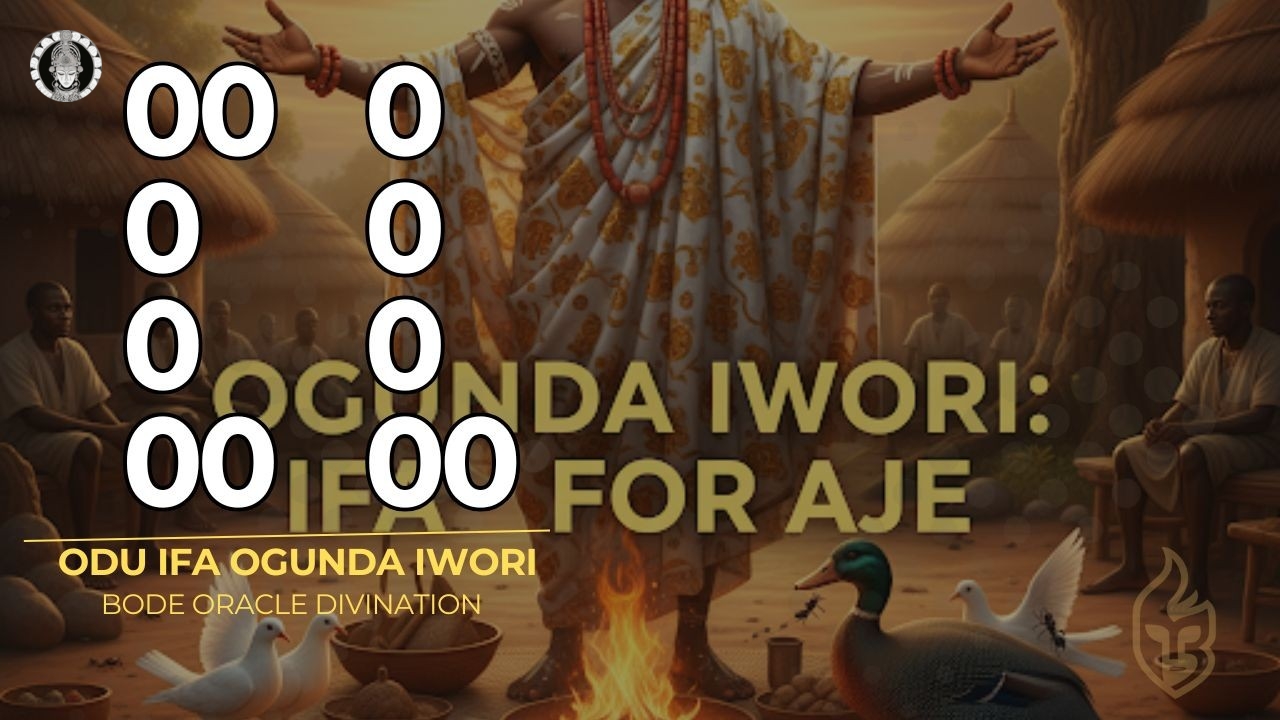
Ifa Divination for Aluba: Victory Over Internal and External Enemies
The Two Categories of Evil
This divination from Ogunda Iwori presents a crucial distinction that appears throughout Yoruba spiritual thought: the difference between "evil in the house" (aluba ile) and "evil outside the house" (aluba ode). This recognition acknowledges an uncomfortable truth—that threats to our wellbeing come not only from strangers and obvious adversaries but also from within our most intimate circles, from those who share our homes, families, and close communities.
"Evil in the house" represents betrayal from those we trust, sabotage from those who should support us, and obstacles created by people with intimate knowledge of our vulnerabilities. This is often more dangerous than external opposition because it's unexpected, because we've lowered our defenses, and because it operates with inside information. "Evil outside the house" represents the more obvious threats—competitors, envious strangers, those who oppose us for clear reasons—but these enemies, while perhaps more numerous, are often easier to identify and defend against.
The Sacred Verse
Ogunda has no bag,
Iwori has no quiver.
The single arrow of Iwori
That was in the bag shook the bag up and down.
Ifa divination was cast for evil in the house
Together with evil outside the house,
When they were coming from heaven to earth.
They were asked to offer sacrifice,
And they complied.
Therefore, both the evil in the house and the evil outside,
It is my duty to rid you of them now.
The Shaking Arrow and Spiritual Agitation
The imagery of the single arrow shaking the bag up and down carries profound meaning. Despite being alone (one arrow in an otherwise empty container), it creates significant disturbance. This teaches that internal enemies don't need great numbers to cause tremendous disruption—a single traitor within can shake an entire household. Similarly, focused opposition from outside, though perhaps singular, can create disproportionate turmoil when it targets vulnerabilities with precision.
The fact that Ogunda has no bag and Iwori has no quiver suggests a state of vulnerability or unpreparedness. Yet the divination promises that through proper sacrifice, even those caught unprepared can be delivered from both categories of evil. The prescription isn't to become impervious to attack but to align with spiritual forces capable of eliminating threats regardless of their origin.
Ifa's Active Role in Elimination
The declaration "It is my duty to rid you of them" represents a critical shift from advisory to executive function. Ifa doesn't merely tell the devotee how to handle enemies or provide tools for self-defense—Ifa takes direct responsibility for elimination. This transforms the devotee's relationship with opposition from personal struggle to divine intervention. The battle isn't abandoned but is fought by forces far more capable than human effort alone.
This promise applies specifically to those who perform the prescribed sacrifice. The elimination isn't automatic or universal but is secured through proper spiritual engagement. The sacrifice serves as both payment for divine service and as the mechanism through which Ifa gains authority to act in the devotee's affairs against opposing forces.
The Warning About Middle Position
Ifa's statement "you are in the middle of enemies" describes a surrounded position—threats from multiple directions simultaneously. This isn't paranoia but realistic assessment of the spiritual battlefield. The devotee receiving this Odu should understand they're not facing a single challenge from one direction but are positioned where both intimate betrayers and external adversaries can strike. This knowledge allows for appropriate spiritual fortification rather than false security.
Prescribed Offerings (Ebo)
For victory over internal and external enemies, Ifa prescribes a rooster (akuko adie), announcing victory and awakening protective forces; a hen (aboadie), representing domestic peace and the cleansing of household evil; doves (eyele), bringing peace after conflict; and money (opolopo owo), facilitating the comprehensive spiritual work necessary to address threats from multiple sources.
Modern Application
In contemporary contexts, this divination speaks to those experiencing workplace betrayal alongside market competition, family conflicts concurrent with community opposition, or any situation where threats converge from multiple directions. It promises that proper sacrifice activates divine forces capable of addressing all categories of opposition simultaneously, not requiring the devotee to fight on multiple fronts with human resources alone.
Ifa Divination for Aje: Wealth That Clings Like Soldier Ants
The Son of Olusiki
This divination introduces us to Aje (Wealth personified), described as the son of Olusiki. The name "Olusiki" suggests mastery or lordship over siki, which in various contexts relates to accumulation, gathering, or holding fast. By identifying Aje as Olusiki's child, the divination establishes that the capacity to attract and retain wealth is inherited, passed down through proper spiritual lineage rather than being randomly distributed.
This genealogical detail teaches that access to wealth isn't merely about effort or opportunity but about spiritual connection to sources of prosperity. Those who receive this Odu and perform the prescribed sacrifice effectively adopt themselves into this lineage, gaining the inherited capacity to attract and hold wealth that might otherwise elude them regardless of their material efforts.
The Sacred Verse
Ogunda fidi iwori joko
Adifafun Aje
Tii somo olusiki
Igba ti n torun bo waye
Ebo won ni o se
O si gbebo nibe o rubo
English Translation
Ogunda maintains Iwori down
Ifa divination was cast for Aje
Who is the son of Olusiki,
When he was coming from heaven to earth.
He was asked to offer sacrifice,
And he complied.
The Metaphor of Soldier Ants and Palm Fruit
The power of this divination lies in its vivid metaphor: "The blessing of wealth comes to me and clings to it like soldier ants cling to palm fruit. The blessing of marriage came to me and clung to it like soldier ants cling to palm fruit. The blessing of children came to me and clung to it like soldier ants cling to palm fruit. The blessing of all good things came to me and clung to it like soldier ants cling to palm fruit."
Anyone familiar with soldier ants knows their legendary grip—once they attach, they cannot be easily removed. They lock their jaws with such force that even death doesn't release their hold. This metaphor promises that blessings received through this Odu don't arrive temporarily or tentatively but attach with permanent, unbreakable grip. Wealth doesn't come and go; it comes and stays. Marriage doesn't form and dissolve; it forms and endures. Children don't merely appear; they establish permanent generational continuity.
The comparison to palm fruit is equally significant. Palm fruit is valuable, nourishing, and productive—it yields oil, wine, and various other benefits. The ants don't cling to worthless objects but to sources of sustenance and prosperity. Similarly, the blessings that cling to the devotee aren't empty titles or appearances but substantial sources of ongoing benefit.
The Comprehensive Coverage
Like the divination for Aja Olele, this verse addresses wealth, spouse, children, and all good things—the totality of human aspiration. However, where Aja Olele emphasized that these blessings arrive ("I have wealth, I have spouse"), Aje emphasizes that they adhere ("wealth clings, spouse clings"). This distinction is crucial: arrival without adhesion means temporary possession, while clinging ensures permanent retention.
The repetitive structure—using the same soldier ant metaphor for each category of blessing—creates cumulative spiritual force. Each repetition reinforces the pattern of permanent attachment, building confidence that no blessing received through this Odu will slip away due to circumstance, opposition, or time.
The Need for All Good Things
Ifa specifically states "this person needs the blessing of wealth" and "needs the blessing of all good things." This language recognizes real deficiency rather than mere desire. The divination addresses those experiencing genuine lack, not just wanting more of what they already have. The promise is transformation from need to abundance, from absence to permanent presence.
Prescribed Offerings (Ebo)
For magnetic attraction and permanent retention of blessings, Ifa prescribes doves (eyele), opening spiritual channels for blessing; guinea fowl (eye etu), representing community recognition and establishment; duck (pepeye), symbolizing adaptability and the ability to prosper in various environments; and money (opolopo owo), facilitating all necessary spiritual work. For scholarly perspectives on Ifa as a knowledge system, refer to comprehensive documentation on Ifa divination.
Modern Application
In contemporary contexts, this divination speaks to those who have experienced fleeting success—wealth that arrives but doesn't stay, relationships that form but don't last, opportunities that appear but slip away. It promises that proper sacrifice transforms temporary fortune into permanent establishment, creating spiritual adhesive that holds blessings in place despite circumstances that would normally cause loss. For understanding the artistic and cultural dimensions of Ifa practice, explore research on algebraic characterization of Ifa divination codes.
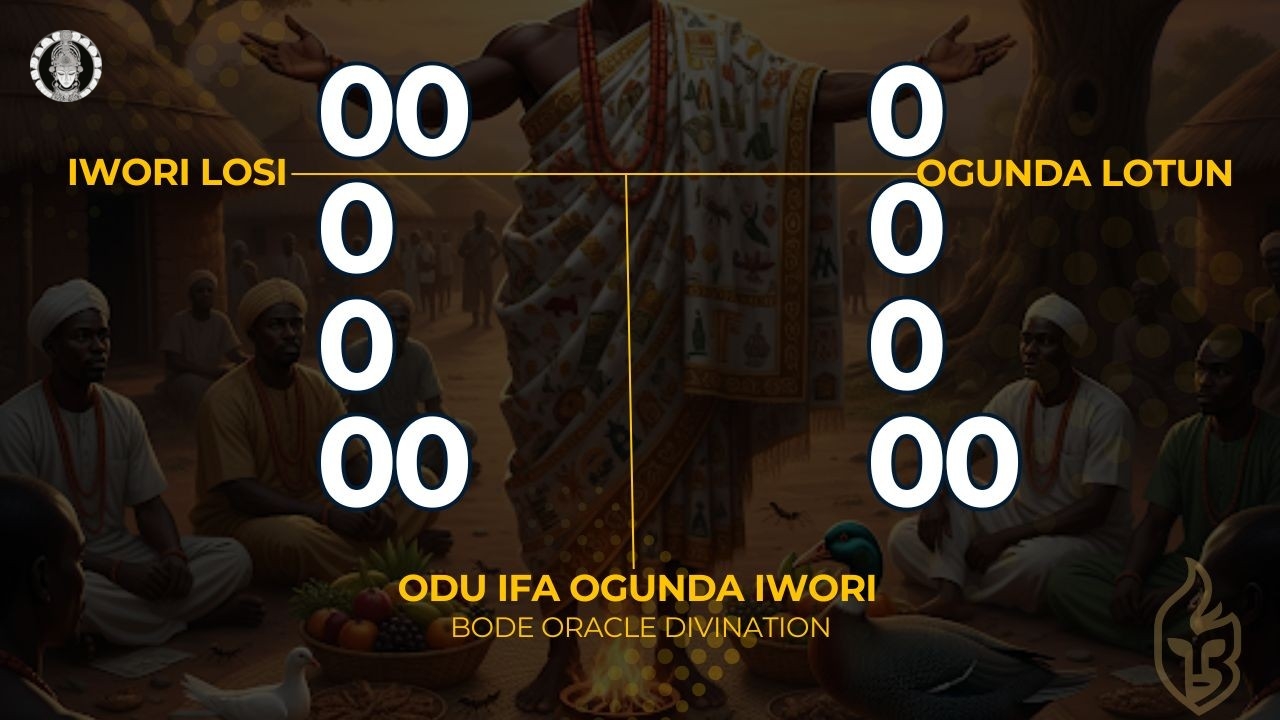
Akose and Spiritual Preparations of Ogunda Iwori
Understanding Akose in Ifa Practice
Akose refers to spiritual preparations or medicinal formulations that combine herbal, animal, and mineral substances with spiritual invocations to produce specific results. Unlike ebo (sacrifices), which are offered to spiritual forces, akose are preparations that the person uses directly on their body or consumes. The akose of Ogunda Iwori are particularly powerful for attracting wealth and establishing permanent prosperity.
Akose Awure Ola: The Living Frog Preparation
This akose represents one of the most potent and complex preparations in the Ifa corpus, designed to attract wealth, honor, and fortune (ola) through multi-dimensional spiritual work. The preparation operates simultaneously on several planes: appeasing potentially opposing spiritual forces, consuming empowering substances, and creating ongoing relationship with protective entities.
Ingredients and Preparation
The akose requires a living frog (opolo aye kan), marijuana (igbo), money (owo tutu), three white doves (eyele funfun meta), complete alligator pepper (odidi atare kan), and wine (oti). The procedure is specific and must be followed precisely: The money is used to purchase both the marijuana and other materials. The marijuana is rolled like a cigarette and placed in the frog's mouth. The frog is then burned alive with the marijuana in its mouth until it dies and becomes charred.
The charred remains are ground into powder along with complete alligator pepper. This powder is mixed into a container (sere). The blood of three white doves is added to this preparation, but the doves themselves are not consumed by the devotee—they serve as food offering to the witches (iya mi). The devotee must divine where the witches will accept this offering and take it to that location.
Spiritual Significance and Function
This preparation works on multiple levels simultaneously. The frog, as a creature that lives between land and water, represents the ability to navigate different realms—material and spiritual, visible and hidden. Its use in burned form with marijuana creates a powerful spiritual smoke that penetrates barriers between worlds.
The inclusion of money in the preparation creates sympathetic magic—money attracts money. The alligator pepper brings spiritual heat and activation. The white doves represent purity and peace, but their blood mixed with the charred frog creates a substance that combines peace with power. The separate offering of dove meat to the witches is crucial—it appeases potentially opposing forces who might otherwise block the devotee's prosperity.
Proper Application and Use
The devotee consumes a small amount of the final powder mixed with wine each morning. This daily practice creates cumulative spiritual effect, gradually transforming the person's spiritual frequency to align with wealth and honor. The morning timing is significant—it sets the spiritual tone for the entire day, ensuring every action taken carries the empowerment of the preparation.
Akose for Wrist Incisions: Seereyo and Alligator Pepper
The second akose of Ogunda Iwori uses a simpler but equally powerful approach, working through incisions at strategic points on the body to empower every action the person takes.
Ingredients and Preparation
This preparation requires obibo leaves (also called seereyo), which are specific to this work and must be properly identified by a knowledgeable practitioner, and complete alligator pepper (odidi atare). The leaves are burned together with the alligator pepper until they become charred. The resulting ash is ground into fine powder.
Application Method
Using a razor or other sharp implement, incisions are made around both wrists in a circular pattern. The powder is rubbed deeply into these cuts, ensuring it enters the bloodstream and becomes part of the person's physical system. The bilateral application (both wrists) ensures balanced empowerment—no action taken with either hand lacks spiritual backing.
Spiritual Function
The wrists represent the channels through which we reach out to grasp opportunities, through which we work, through which we receive and give. By marking these strategic points with spiritually charged substances, every reaching gesture becomes empowered to capture and hold wealth. Every handshake becomes a conduit for blessing. Every transaction becomes spiritually favorable.
The alligator pepper brings heat—not destructive fire but the heat of transformation, activation, and spiritual power. The obibo leaves contribute their specific properties of attraction and holding. Together, they create a permanent mark that continuously broadcasts spiritual signal attracting prosperity while simultaneously gripping any blessing that comes near.
Critical Safety and Ethical Considerations
Both akose preparations should only be prepared and applied under the direct guidance of a qualified Babalawo or Iyanifa. The spiritual power comes not just from the physical ingredients but from the prayers, invocations, and spiritual knowledge that accompany their preparation and use. Attempting these preparations without proper training and spiritual authority can produce unpredictable or harmful results.
The akose involving the frog requires special ethical consideration. Traditional practice views all creatures as having spiritual significance, and the taking of life—even of a frog—for spiritual purposes must be done with proper prayers, gratitude, and spiritual authorization. Modern practitioners must also consider legal restrictions on the use of certain substances and adapt traditional practices within legal and ethical boundaries.
The incision akose creates permanent marks on the body and introduces foreign substances into the bloodstream. This must be done in clean conditions with sterile implements to prevent infection. Those with bleeding disorders, immune compromise, or other health conditions should consult medical professionals before considering such procedures. For understanding the comprehensive nature of Ifa as a recognized knowledge system, explore UNESCO's recognition of the Ifa divination system.
Additional Resources
Internal Links
- Complete Guide to Ogunda Iwori - Detailed information, taboos, and practices
- Bode.ng Blog - Extensive collection of Ifa and Yoruba spirituality articles
- Complete Odu Ifa Directory
- All About the 16 Odu Ifa and Their Meaning
External Resources
- African Traditional Religions: Ifa Divination - Duquesne University
- Ifa Divination System - Wikipedia
- Algebraic Characterization of Ifa Main Divination Codes
- UNESCO Recognition of Ifa Divination System
Connect With Us on Social Media
- BODE Oracle on TikTok
- BODE Oracle on YouTube
- BODE Oracle on Facebook
- BODE Oracle on X (Twitter)
- BODE Oracle on Pinterest
Visit Bode.ng to explore more divination teachings, participate in quizzes and polls, and connect with our community of practitioners and learners. Register today to access exclusive content and personalized guidance on your spiritual journey.
Frequently Asked Questions And Answers About Odu Ifa Ogunda Iwori
Find answers to common questions about this sacred Odu Ifa and its divination teachings
Ogunda Iwori is one of the 256 sacred Odu (divination signs) in the Ifa corpus. It carries powerful messages about unwavering spiritual loyalty, comprehensive blessing acquisition, victory over internal and external enemies, and the magnetic attraction of wealth that clings like soldier ants to palm fruit. This Odu teaches that Ifa provides constant companionship and protection to those who maintain their relationship through proper sacrifice, never abandoning devotees who remain faithful.
The divination of Jaja, client of the crocodile, establishes the fundamental principle that Ifa never abandons those who properly maintain their spiritual relationship. The critical question 'Where do you live with your Ifa?' emphasizes that Ifa's presence and protection are not abstract concepts but lived realities requiring physical acknowledgment and continued devotion. This Odu promises that Ifa itself ensures blessings reach the devotee, acting as both guardian and facilitator of prosperity.
The divination for Aja Olele demonstrates how comprehensive blessing operates through this Odu. The repetitive structure declares: 'Ifa says I will have wealth, and I have wealth; Ifa says I will have a spouse, and I have a spouse; Ifa says I will have children, and I have children; Ifa says I will have all good things, and I have all good things.' This total coverage represents Ifa's capacity to address every area of human aspiration simultaneously when proper sacrifice is performed.
The divination for Aluba distinguishes between 'evil in the house' and 'evil outside the house,' teaching that threats to wellbeing come from both intimate circles and external sources. Ogunda Iwori provides protection against both categories through prescribed sacrifice. The Odu declares 'it is my duty to rid you of them,' demonstrating Ifa's active role in eliminating obstacles rather than merely advising on how to handle them.
The divination for Aje uses the vivid metaphor of soldier ants clinging to palm fruit to describe how blessings attach to those who receive this Odu and perform the prescribed sacrifice. Just as these ants grip so tightly they cannot be easily removed, so too do wealth, marriage, children, and all forms of blessing adhere to the person. This represents not fleeting fortune but permanent establishment in prosperity.
This powerful preparation involves a living frog, marijuana, money, and specific ritual procedures to attract wealth and honor. The frog is burned with rolled marijuana placed in its mouth, then ground with alligator pepper and mixed with the blood of three white doves. Part of the preparation feeds the witches (iya mi) at their accepted location, while the remaining powder is consumed with wine each morning. This akose works on multiple spiritual dimensions simultaneously.
The second akose combines obibo leaves (sereyo) burned with complete alligator pepper to make incisions around both wrists. The wrists represent the channels through which we reach out to grasp opportunities and through which blessings flow into our possession. By marking these strategic points with spiritually charged substances, every reaching gesture becomes empowered to capture and hold wealth.
The divination of Jaja explicitly states that devotees 'must always be at Ifa's side and never leave.' This is not metaphorical distance but refers to maintaining physical shrines, regular consultation, consistent sacrifice, and active engagement with Ifa practice. The Odu warns that blessings depend on proximity—not just spiritual belief but tangible, ongoing relationship maintained through prescribed practices and devotion.
This phrase from Aje's divination suggests dynamic interaction between the two component Odu. Ogunda (representing force, determination, and clearing obstacles) keeps Iwori (representing wisdom, patience, and deep knowledge) grounded and practical. Together they create a balanced approach where spiritual wisdom is applied with determined force, and aggressive action is guided by deep understanding.
All sacrifices (ebo) and spiritual preparations (akose) in Ogunda Iwori should be performed under guidance of a qualified Babalawo or Iyanifa. The priest ensures proper procedures, invokes necessary incantations, and adapts traditional practices to modern contexts. Different divinations require specific combinations: doves, roosters, hens, snails, guinea fowl, ducks, rats, fish, and money—each carrying distinct spiritual properties that work together to achieve the desired outcome.
You can explore comprehensive information about Ogunda Iwori through several resources:
- Complete Guide to Ogunda Iwori - Detailed taboos and practices
- Bode.ng Blog - Extensive articles on Ifa spirituality
- Complete Odu Ifa Directory
- Bode.ng - Access divination services and community resources
Connect with us on social media for regular teachings: TikTok, YouTube, Facebook, X (Twitter), and Pinterest @BODEOracle.
